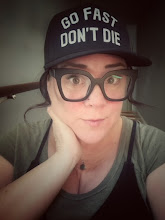I’m writing this while sitting on a flight from Minneapolis to Kansas City. Earlier tonight, my mother-in-law asked me if I enjoy traveling alone. I do. A lot. Part of it is the tiny break from the day-to-day madness of having two kids under six. Part of it is exploring somewhere new. And part of it is simply remembering what it was like before I had people who depended on me for everything. I’m not writing about some wonderful self-discovery here, I just think traveling alone is a rare treat for me, and this weekend I got to do just that when I flew to Rochester, NY, for a quick weekend with my Aunt Karen and her family.
During the weekend, Karen and I drove to New Paltz, NY, which lies on the Hudson River about an hour and a half outside of New York City. It’s a beautiful area, truly, with mountains and the Hudson River and the Erie Canal, and all of these tiny towns tucked into the scenery. I attended a workshop put on by the Hudson Valley Writing Project in New Paltz. Yep, this could totally be yet another love letter to the National Writing Project and all of its local sites, but I will spare you that. Again. You’re welcome. This weekend I got to spend time with early childhood educators and it was fantastic. The best part? Meeting 80-year-old
Deborah Meier and getting to listen to her talk about her experiences and stories.
Deborah is many things: first and foremost a teacher, she has opened schools, she is a public advocate for education and education reform. A mutual friend called her, “...a piston. One of our true legends in the field.” She truly should be an inspiration to educators everywhere. She spent a lot of time this weekend talking about how schools in the United States spend an inordinate amount of time teaching kids the right answers. I wanted to jump up and clap when I heard this, because I’ve been thinking a lot recently about the current state of our education system and particularly about how schools are no longer teaching or empowering students to think critically…about much of anything.
We talked about the power of play in early childhood classrooms and about how when children learn to play, they in turn learn to think. Ok, really, I could write a book about that last sentence – I’m REALLY dumbing that down for the sake of time and space and not boring you. We talked about how many kindergarten teachers these days are encountering children in their classrooms who have no idea how to play. Teachers are having to model play in classrooms because these children aren’t playing at home, and the early childhood programs they may have attended are doing away with play in favor of more "concrete" learning. Can you believe that? It’s terribly sad to me.
One of my favorite quotes from Deborah this weekend was “children know how to play until we teach them not to.” Like I said, I could go on and on and on about my feelings on this subject, but mostly I wanted whomever might read this to simply think about it. How did you play as a child? What did you pretend to be? Do (or did?) your children play? How are you embracing and encouraging the play that is happening in your home? Yes, that’s right, I said encouraging play. Do it.
Right now I’m reading
A Child’s Work, the Importance of Fantasy Play by Vivian Gussin Paley, a book I picked up this weekend. I’m sure that I will have plenty more to say about this book as well, but I just wanted to present the idea of play to you. In a time where schools, particularly early childhood programs, are doing away with play, and turning preschool curriculum into sit-at-a-desk-and-learn
school school, I think it’s super important to look at WHY play is so important for children. I can’t tell you how nice it was this weekend to sit with a group of smart early childhood educators who agree with this stuff – it’s proof to me that we are going to do something to change the way things are going in early childhood education…one superhero or princess at a time.


